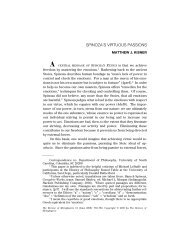heidegger's being and time and national socialism - Philosophy ...
heidegger's being and time and national socialism - Philosophy ...
heidegger's being and time and national socialism - Philosophy ...
Create successful ePaper yourself
Turn your PDF publications into a flip-book with our unique Google optimized e-Paper software.
stance of the term Volksgemeinschaft in the entire<br />
book. Thus it might look farfetched to see here an<br />
option for the National Socialists. However,<br />
Heidegger definitely knew Scheler’s book Formalism<br />
in Ethics, <strong>and</strong> in his obituary in 1928 on<br />
him Heidegger praised Scheler as the “strongest<br />
philosophical force” worldwide <strong>and</strong> at the same<br />
<strong>time</strong> left no doubt that he stoutly disapproved of<br />
everything related to Scheler’s Catholicism <strong>and</strong><br />
his turn. 25 Heidegger opts in §74 for that type of<br />
community which, according to Scheler, is the<br />
lowest <strong>and</strong> in which the individual is treated<br />
merely as a means of the well-<strong>being</strong> of the community.<br />
In addition, Heidegger most probably<br />
knew that the National Socialists promoted the<br />
community of the people as the one <strong>and</strong> only<br />
community which everyone <strong>and</strong> everything had<br />
to serve. Furthermore, while neither the<br />
existentials themselves nor much of what<br />
Heidegger develops regarding them is fascist,<br />
Heidegger did not develop in Being <strong>and</strong> Time any<br />
means to distance himself from National Socialism.<br />
Nay, he even criticized the means that others,<br />
say Scheler, had to draw a line between them<br />
<strong>and</strong> National Socialism. 26 Finally, in<br />
1936 Heidegger said in Rome to Karl Löwith<br />
that the notion of historicality in Being <strong>and</strong> Time<br />
was the basis of his engagement with National<br />
Socialism. 27 Thus his invocation of the community<br />
of the people was most probably a conscious<br />
option for the National Socialists. 28<br />
The Existentials in Division One<br />
of Being <strong>and</strong> Time<br />
Being <strong>and</strong> Time contains two kinds of investigations.<br />
Heidegger discovers the existentials that<br />
make it possible for human <strong>being</strong>s to be in a<br />
world <strong>and</strong> relate to <strong>being</strong>s in specific ways. He<br />
assumes that each of these existentials is omnipresent<br />
in the sense that, whenever <strong>and</strong> wherever<br />
human <strong>being</strong>s exist, these existentials have always<br />
already been at work. 29 This is thought from<br />
the perspective of transcendental philosophy, <strong>and</strong><br />
thus it does not come as a surprise that, in his exposition<br />
of the concept of phenomenon,<br />
Heidegger adduces as the only example Kant’s<br />
theory of space as form of intuition. 30 However,<br />
PHILOSOPHY TODAY<br />
258<br />
these existentials can be actualized in two different<br />
ways, namely, so to speak, in a genuine or<br />
neutral way on one side <strong>and</strong> in a fallen way on the<br />
other, <strong>and</strong> this difference prepares the way for<br />
one of the two main topics of Division Two, the<br />
issue of authenticity <strong>and</strong> how to achieve it. In<br />
Historical Destiny <strong>and</strong> National Socialism in<br />
Heidegger’s Being <strong>and</strong> Time, I characterized<br />
Heidegger’s notion of historicality as a<br />
“temporalized version of a metaphysics of falling<br />
<strong>and</strong> recovering.” 31 There was a state, A, in which<br />
the origin was properly present. However, a different<br />
state, B, emerged in which the origin is no<br />
longer present. Not only is the origin no longer<br />
present, but B even covers up its relation of dependency<br />
<strong>and</strong> deficiency with regard to A <strong>and</strong><br />
claims to be a <strong>being</strong> in its own right <strong>and</strong> not dependent<br />
on anything. What some Heideggerians<br />
rightly say about the Heidegger of the history of<br />
Being <strong>and</strong> his assessment of metaphysics within<br />
that history already applies to Being <strong>and</strong> Time, 32<br />
namely, that Heidegger works with a theory of a<br />
double fall or a double forgetting. The first is the<br />
downward plunge that B is in comparison to A,<br />
the second is B’s work to make invisible its relation<br />
to A <strong>and</strong> A itself. However, the origin has to<br />
be properly present. Thus there will be an event<br />
in the course of which the origin will reaffirm itself<br />
<strong>and</strong> make B properly present the origin. In<br />
my book, I adduced as examples of this motif<br />
Heidegger’s concepts of origin, primordial temporality,<br />
authenticity, wholeness, <strong>and</strong> the different<br />
forms of solicitude (Fürsorge; in Stambaugh’s<br />
translation, concern) before showing<br />
that the notion of historicality displays the same<br />
structure. 33 In this section, I present aspects of the<br />
They <strong>and</strong> the different forms of solicitude <strong>and</strong><br />
then briefly comment on the other existentials<br />
that Heidegger discusses in Division One of<br />
Being <strong>and</strong> Time.<br />
Heidegger’s theory of the They is part of his<br />
theory of the existential Being-with-other-<br />
Dasein, the second existential in Division One. A<br />
They regulates the possibilities of behavior in a<br />
group of humans, it sanctions some <strong>and</strong> rules out<br />
other possibilities. 34 In §27 Heidegger presents<br />
six characteristics of a They. The first is<br />
“distantiality [Abständigkeit],” the only one on
















